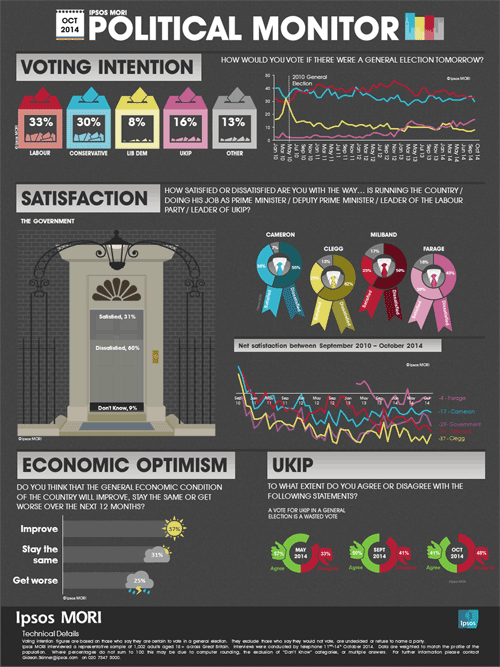Voting UKIP no longer seen as a wasted vote, as the party reaches its highest ever vote share
October’s Ipsos Political Monitor shows that, in the aftermath of Douglas Carswell’s by-election win for the party, more of the British public now disagree that voting UKIP in a general election is a wasted vote than agree. Just under half (48%) disagree that a general election vote for UKIP is a wasted vote, compared with 41% who agree. This is a turnaround from earlier this year – last month, prior to the Clacton by-election, 50% thought a UKIP vote was a vote wasted and 41% disagreed; in May, some 57% thought voting UKIP was a wasted vote and just 33% disagreed.
UKIP’s vote share this month is also the highest we have seen in Ipsos’s polls. UKIP are now on 16% of the vote, up one point from last month. Labour lead the polls having been behind by a single point last month, but only by virtue of the Conservatives’ vote share falling – Labour are unchanged from last month on 33%, with the Conservatives on 30%. The Liberal Democrats are up one point on eight percent, while the Green Party are down one point on five percent.
The combined 63% of support for Labour and the Conservatives is historically low for the two largest parties in British politics. The last time we saw their share this low was in April 2010, when the Liberal Democrats were flying high at 32% following the televised election debates.
Economic Optimism is down this month, with 37% now thinking the general economic condition of the country will improve over the next year; 31% now think the economic condition will stay the same, while 25% think it will get worse, giving an Ipsos Economic Optimism Index score (% improve minus % get worse) of +12. This is down from a score of +24 last month (when 45% thought it would improve, 21% that it would get worse) – and from an all-time high of +35 back in May (53% improve, 18% get worse).
Satisfaction ratings for the main party leaders and government have seen a decline for Ed Miliband and a rise for Nick Clegg, while Messrs Cameron and Farage have remained stable:
- Satisfaction in Ed Miliband’s performance as Labour leader is now at its lowest since September last year at 25%, down four points from 29% last month. Six in ten (59%) are dissatisfied, giving him a net rating (% satisfied minus % dissatisfied) of -34. More Labour supporters are now dissatisfied with their leader’s performance (46%) than are satisfied (42%).
- While remaining the leader with the lowest net rating, Nick Clegg is almost at level pegging with Mr Miliband. One in four (25%) are now satisfied with his performance as Deputy Prime Minister, while 62% are dissatisfied (down from 66%), giving him a net rating of -37.
- Satisfaction in David Cameron is at 38% (from 37% last month), with 55% dissatisfied (from 54% last month), giving him a net rating (% satisfied minus % dissatisfied) of -17.
- Satisfaction in Nigel Farage is at 39% (unchanged from last month), with 43% dissatisfied (from 44% last month), giving him a net rating of -4.
- Net satisfaction in the performance of the government is at -29, with 31% satisfied and 60% dissatisfied (from 36% satisfied and 56% dissatisfied last month).

Downloads
Bobby Duffy, Managing Director at Ipsos said:
“These results represent another breakthrough in public opinion for UKIP, particularly the big drop in the proportion who think a vote for them is wasted. The other main parties were counting on a continuing sense that there was no point voting for Nigel Farage’s party. It may not be a surprise that the public are no longer so sure, given the by-election results - but it is still hugely important to UKIP’s prospects in the General Election.”
Technical note:
Ipsos interviewed a representative sample of 1,002 adults aged 18+ across Great Britain. Interviews were conducted by telephone 11 – 14 October 2014. Data are weighted to match the profile of the population.



